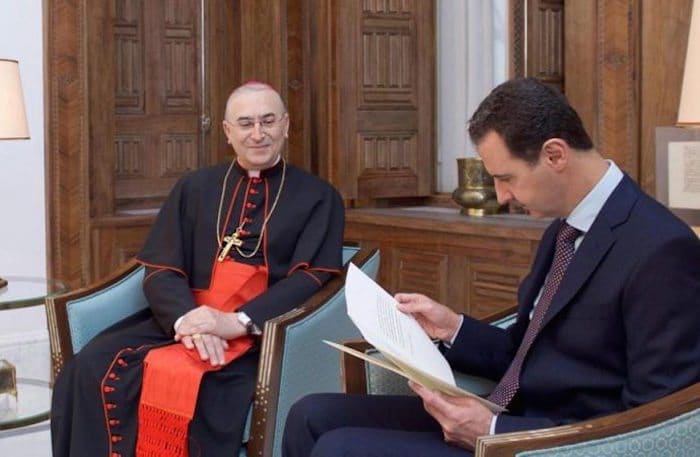The President of Syria, Bashar al-Assad, reads a letter by Pope Francis given to him by Cardinal Mario Zenari, Apostolic Nuncio to Syria. (Credit: Syrian Arab News Agency.)
SPECIAL TO CRUX
The anniversary week of Pope Francis has prompted many commentators to list the highlights of the pontificate. The pope’s foreign policy – especially in Syria – should not be added to these lists. Vatican diplomacy has resulted in Assad being more secure in Damascus, with his staunch ally Putin playing a greater role in the Middle East.
My colleague, John Allen, listed various “clear wins” under which he included the pope’s foreign policy. That struck me as curious, because it seems that what in the Vatican parlance is called “relations with states” is one of the weak points of the Franciscan pontificate.
Pope Francis has devoted particular attention to four countries – Syria, Ukraine, Cuba and Venezuela. It is hard to see how the ordinary people of any of those countries, to say nothing of the Catholic population, is better off for those interventions.
Is Pope Francis responsible for the human disasters in those countries? Obviously not. But they can hardly be characterized as success stories of papal diplomacy – even Cuba, which is the one most trumpeted as such. But that’s a separate case. Syria bears examination, about which Allen wrote:
In September 2013 [Pope Francis] led the moral charge against a proposed Western military intervention in Syria following charges that Bashar al-Assad had deployed chemical weapons against opposition-controlled areas around Damascus. Francis launched an all-out diplomatic push against widening the conflict, and was later credited by Russian President Vladimir Putin with being decisive in halting the momentum with the G8 towards supporting the initiative.
Having Putin credit you with stopping Western action would seem to be grounds for criticism, not compliment. In September 2013, Pope Francis was at the height of his global popularity. His “Who am I to judge?” airborne press conference earned him exultant praise from the global lifestyle left. Doctrinal controversies within the Church were still in the future.
He invested his full stature in opposing possible American-led strikes to enforce President Barack Obama’s red line against the use of chemical weapons. He called for Catholics the world over to join his St. Peter’s prayer vigil against Western military action.
Had Obama been determined to enforce his policy, Francis could not have stopped him. Yet the papal diplomatic effort did have its effect, and the Syrian situation was resolved with Assad having to hand over his chemical weapons to the United Nations, where he could count on Russia’s Security Council veto to protect him. The Russians would also be the guarantor of Assad’s compliance, meaning that one ally was monitoring the other.
The Obama collapse – widely considered the greatest failure of his foreign policy – established Russia as the principal foreign power in Syria. Putin badly outmaneuvered Obama, and while Francis did not put the Vatican on Putin’s side, in opposing Western action he advanced a resolution that favored the interests of both Assad and Putin.
After Assad’s use of chemical weapons, the Obama-Francis diplomacy resulted in Assad more secure in Damascus, with his staunch ally Putin playing a greater role in the Middle East than Russia had played since Anwar Sadat threw the Soviets out of Egypt in 1972.
Neither pope nor president regarded their efforts in Syria as a massive failure at the time, but Putin certainly regarded it as a major victory. He immediately began to flex Moscow’s muscles in Ukraine, directing his ally there to abandon a proposed agreement with the European Union in favor of an alliance with Russia and Belarus.
The ensuing Ukrainian popular uprising challenged Putin’s plans, but he had to wait until after the Sochi Olympics in 2014 to act. The Olympic torch was hardly extinguished before Russian troops were on the move, invading and swallowing up Crimea. There was no Obama red line this time. There was no papal prayer vigil.
Putin, having calculated that between Obama and Francis he would face neither significant material nor moral opposition, would move from strength to strength. Russian troops would invade eastern Ukraine and occupy it. In time, he and his ally Assad would cement their control of what was left of Syria with the brutal razing of Aleppo.
The irony is even more cruel when one considers that the post-2013 Syrian refugee crisis that has so destabilized Europe is another result of the strengthening of Assad and Putin. Pope Francis has been insistent on the obligation to receive refugees; he has been less vocal on the causes that drive refugees from their homes. The millions of Syrian refugees are the result of Assad’s civil war and ineffective international action. Papal diplomacy was on the side of what turned out to be ineffective international action.
Papal diplomacy subsequently resorted to offering gestures – powerful gestures, but gestures – that seek to comfort the afflicted who can expect no practical assistance from the international community. Pope Francis made the nuncio in Syria a cardinal and had him deliver a letter to Assad, asking him to stop massacring his opponents. The Vatican organized a collection in Europe to support Ukrainians suffering from Russian aggression. Gestures are what remain when policy fails.
Perhaps there was nothing that the Holy See could have done that would have impeded the march of Putin once Obama abandoned the field. Yet it remains that the papal intervention did make it more difficult for Obama to enforce his policy, had he wanted to.
The global pressure brought to bear by Pope Francis favored the villains, even if that was clearly not the intention. That is little comfort to the suffering. Naïveté in the relations with states is costly, even if well intentioned. It was not a “clear win” for Pope Francis, and much less so for the Syrian people.

